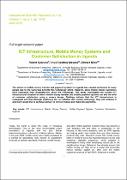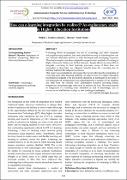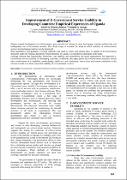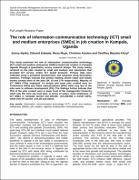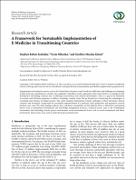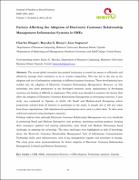Browsing by Issue Date
Now showing items 1-20 of 1014
-
Entrepreneurial motivation in developing countries: what does “necessity” and “opportunity” entrepreneurship really mean?
(Frontiers of Entrepreneurship Research, 2006-10-06)The paper examines the relationship between the state of necessity and entrepreneurial activity, through qualitative case studies from Uganda and Sri Lanka, and a survey of 1006 Ugandan adults. Questions are posed on the ... -
Reassessing Necessity Entrepreneurship in Developing Countries
(Institute for Small Business & Entrepreneurship, 2006-11-02)The paper examines the relationship between the state of necessity and entrepreneurial activity, through qualitative case studies from Uganda and Sri Lanka, and a survey of 1006 Ugandan adults. Questions are posed on the ... -
Social Norms and Tax Compliance among Small Business Enterprises in Uganda
(Makerere University Business School, 2009-08)The study was prompted by the high and alarming rates of non-tax compliance among Small Business Enterprises in Uganda. The reason of this study was therefore to establish the relationship between Social Norms, Taxpayers’ ... -
Organizational Culture, Organizational Capabilities, Change Processes and Change Implementation: A case of Makerere University Business School
(Makerere University Business School, 2009-09)The study was instituted to examine the relationship between the Organizational culture, Change processes and the effectiveness of the implementation of change conducted in Makerere University Business School. It was ... -
Leasing Competence, Lease Structure and Perceived Performance of SMEs in Uganda
(Makerere University Business School, 2009-10)Small and medium-sized enterprises (SMEs) make up approximately 90 per cent of Uganda’s private sector and contribute two-thirds of national income. In Uganda, leasing has bridged the current financing gap experienced by ... -
An analysis of e-learning information system adoption in ugandan universities: Case of makerere university business school.
(2012-04)This paper presents an examination of e-learning Information Systems failures and adoption problems in Ugandan universities based on Rogers and Shoemaker’s Diffusion of Technological Innovation Theory. Makerere University ... -
Why do nascent ICT businesses die young?
(2012-05)This study sought to investigate why most nascent ICT businesses failed during their early stages in Uganda along the constructs of the family business sustainability model. A quantitative survey research design was ... -
ICT Infrastructure, mobile money systems and customer satisfaction in Uganda
(2012-06)The advent of mobile money transfer and payment systems in Uganda has caused excitement to many people due to the numerous benefits this technology offers. However, some mobile money customers have expressed their ... -
A system dynamics Pricing model for stabilizing prices for telecommunication products and services in Uganda
(2012-06)This study involved the use of systems dynamics approach to develop a pricing model for telecommunication goods and services in Uganda. Primary data were collected from four telecommunication service providers and Uganda ... -
Factors affecting the pricing of telecommunication products and services in Uganda
(2012-09)Improving universal access to telecommunications has become a very critical area of concern in both developed and developing countries in the recent past due to the huge contribution of the sub-sector to socio-economic and ... -
A framework for the adoption of electronic customer relationship management information systems in uganda
(2013)This study proposes a framework for the adoption of Electronic Customer Relationship Management (e-CRM) information systems in Uganda. Both qualitative and quantitative research methods were used. Primary data were ... -
How can e-learning integration be realized? An exploratory study in higher education institutions
(2013)E-learning, which encompasses the use of technology and other computer enhanced learning methods, has been identified one way of delivering low cost and efficient education service in both developed and developing countries. ... -
Strategizing for firm excellence in Innovation: An exploratory study of entrepreneurial tendencies and behaviors in SMEs in Uganda
(2013)The ability to innovate on a sustainable basis is a desirable, and yet, a rare skill that firms need to nature and develop amongst its business managers/owners and employees. This study was aimed at empirically exploring ... -
A framework for the integration of e-learning in higher education institutions in developing countries
(2013)The aim of this research was to design a framework for integrating e-learning in Higher Education Institutions in developing countries. Data were collected from 266 university students and staff of five universities in ... -
Improvement of e-government service usability in developing countries: empirical experiences of Ugande
(2013-03)Despite several developments in e-Government, governments and citizens in most developing countries ineffectively and inadequately use e-Government services. This study sough to examine the areas in which usability of ... -
The role of information communication technology (ICT) small and medium enterprises (SMEs) in job creation in Kampala, Uganda
(Peak Journals, 2013-11-07)This study examined the role of information communication technology (ICT) small and medium enterprises (SMEs) toward job creation in Kampala Uganda through a quantitative survey research design. The study mainly centered ... -
A framework for sustainable implementation of e-medicine in transitioning countries
(Hindawi publishing corporation, 2013-11-18)Organizations in developed countries such as theUnited States ofAmerica andCanada face difficulties and challenges in technology transfer from one organization to another; the complexity of problems easily compounds when ... -
Examining health information systems success factors in Uganda’s healthcare system
(2014)Healthcare Health Information Systems offer several benefits towards healthcare service delivery in Uganda including easy record keeping, enhancing communication, performing simple calculations, supporting decision making, ... -
Factors Affecting the adoption of electronic customer relationship management information systems in SMEs
(2014)The recent global recession has pushed businesses to search for means to efficiently and effectively manage their customers so as to remain competitive. This has led to the rise in the adoption and use of information ... -
Alignment of information systems to strategy in the health sector using a systems dynamics approach
(2014)ABSTRACT Alignment of Information Systems with organizational objectives and strategy is a key factor for the success of information systems. However, most health facilities have not aligned their Health Information ...








